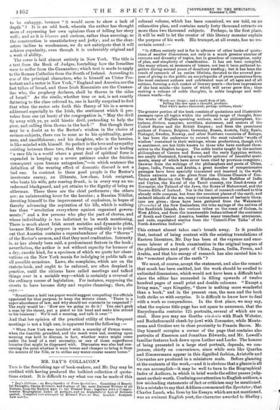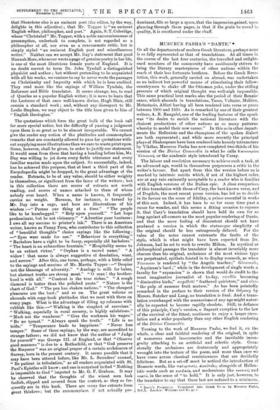MR. DAY'S COLLACON.* THIS is the flourishing age of book-makers,
and Mr. Day may be credited with having produced the bulkiest collection of quota- tions extant. It is difficult to say what use can be made of this
* Day's Collation : an Encyclopeedia of Prose Quotations. Consisting of Beauti- ful Thoughts, Choice Extracts, and S■yines r..f the most Eminent Writers of all Nations, from the Earliest Ages t- the the Present Time; together with o Compre- hensive Biographical Index of Authors, and an Alpbabeticti List of Subjects quoted. Compiled and arranged by Edward Pars,ns Day. London : Sampson Low and Co.
colossal volume, which has been conceived, we are told, on an exhaustive plan, and contains nearly forty thousand extracts on more than two thousand subjects. Perhaps, in the first place, it will be well to let the creator of this literary monster explain the purpose of his work. His trumpet, at all events, has no un- certain sound :—
" It differs entirely and is far in advance of other books of quota- tions of smaller dimensions, not only in a much greater number of extracts and diversity of topics, but in grandeur of conception, unity of plan, and simplicity of classification. It has not been compiled, like many others, at moments of leisure, nor has it been gathered to- gether daring several years of desultory reading; but it has been the result of research of an entire lifetime, devoted to the avowed pur- pose of giving to the public an encyclopaedia of prose quotations from the most eminent authors and celebrated men of all ages and of all nations, forming a rich casket of literary pearls—the best impressions of the beat minds—the lustre of which will never grow dim ; thus making a volume of noble thoughts, in noble language and well- chosen words—for
Words are things ; and a small drop of ink, Falling like dew upon a thought, produces That which makes thousands, perhaps millions, think.'
The greater portion of the book consists of quotations and illustrative passages upon all topics within the ordinary range of thought, from the works of English-speaking authors, such as philosophers, his- torians, divines, essayists, novelists, statesmen, and orators of the United States and the British Empire ; and from the prominent authors of France, Belgium, Germany, Russia, Austria, Italy, Spain, Portugal, Sweden, Norway, and other Northern countries of Europe, it has been the endeavour to extract the most valuable words of wisdom' contained in their writings, whose productions, though rich in sentiment, are but little known to those who have confined them- selves to the English tongue. The noble truths taught by the ancient philosophers of Greece and Rome, and the early Egyptian writers, are amply illustrated, forming a valuable epitome of beautiful senti- ments, many of which have never been cited by previous compilers ; likewise from the writings of the philosophers and poets of China, Japan, India, Persia, and Arabia, a great number of comprehensive passages have been specially translated and inserted in the work. Choice extracts are also given from the Chinese Classics of Con- fucius and Mencius, the Vedas of Hindustan, the Buddhas of India and Ceylon, the Ku-ral of the Tamil country, the Zend-Avesta of Zoroaster, the Talmud of the Jews, the Koran of Mahommed, and the Snorra-Edda of Iceland. Nor is the limit of research confined to this already wide compass, but from the remotest places of the earth, and isolated islands of the sea, many curious specimens of barbaric, litera- ture are given ; these have been gathered from the Wakatauki (Proverbs) of the New Zealanders, the trite sayings of the natives of the Sandwich Islands, the various tribes on the coast of Guinea, in West Africa, and from the innumerable Indian tribes of the continent of South and Central America, besides many trenchant utterances, and rude, unpolished similes from the Council-Fire Talks' of the North-American Indians."
This extract almost takes one's breath away. Is it possible that, instead of being content with the existing translations of Eastern literature, Mr. Day has been at the expense and enor- mous labour of a fresh examination in the original tongues of the philosophers and poets of China, Japan, India, Persia, and Arabia, and that his energy of research has also carried him to the "remotest places of the earth"?
We must, of course, accept the statement, and also the remark that much has been omitted, lest the work should be swelled to unlimited dimensions, which would not have been a difficult task since the editor has succeeded in filling upwards of twelve hundred pages of small print and double columns. " Except a living man," says Kingsley, " there is nothing more wonderful than a book," and in the present case, the man and the book both strike us with surprise. It is difficult to know how to deal with a work so compendious. In the first place, we may say, what the copious title-page has not space to announce, that the Encyclopedia contains 125 portraits, several of which are on steel. Here you may see Goethe vis-d-vie with Noah Webster, and Rochefoucauld cheek-by-jowl with Zoroaster, while Monte- zuma and Grotius are in close proximity to Francis Bacon. Mr. Day himself occupies a corner of the page that contains also portraits of Emerson and Jonathan Edwards, and Mr. Lowell's familiar features look down upon Luther and Locke. The honour of being presented in a large steel portrait, depends, we con- jecture, chiefly on convenience, since while men like Quarles and Zimmermann appear in this dignified fashion, Aristotle and Cervantes are produced in a miniature scale. Before glancing at the contents of the work,—and it is obvious that a glance is all we can accomplish—it may be well to turn to the Biographical Index of Authors, in which in brief words the editor passes judg- ment on their worth. Confining our attention to English authors, a few misleading statements of fact or criticism may be mentioned. It is a mistake to say that Addison commenced the Spectator; that Charles Lamb, who lives by his Essays, which are not mentioned, was an eminent English poet, the character awarded to Shelley ;
that Shenstone also is an eminent poet (the editor, by the way, delights in this adjective) ; that Mr. Tapper is "an eminent English writer, philosopher, and poet." Again, S. T. Coleridge, whose " Christabel " Mr. Tupper, with a noble unconsciousness of presumption, undertook to complete, is not regarded as a philosopher at all, nor even as a consummate critic, but is simply styled "an eminent English poet and miscellaneous writer." Neither can we accept Mr. Day's statement that good Hannah More, who never wrote a page of genuine poetry in her life, is one of the most illustrious female poets of England. It is no doubt correct to term Dr. John Tyndall a distinguished physicist and author ; but without pretending to be acquainted with all his works, we venture to say he never wrote the passages on Christianity and Impurity with which he is here credited. They read more like the sayings of William Tyndale, the Reformer and Bible translator. It seems strange, too, to read of Quarles as a popular English writer; it is news to learn that the Lectures of that once well-known divine, Hugh Blair, still remain a standard work ; and, without any disrespect to Mr. Leslie Stephen, we may object to the title here given to him of " English theologian."
The quotations which form the great bulk of the book call for more special notice, but the difficulty of passing a judgment upon them is so great as to be almost insuperable. We cannot give the reader any notion of the platitudes and commonplace remarks that are constantly allowed to pass for quotations with- out supplying more illustrations than we care to waste print upon. Some, however, shall be given, in order to justify our statement. It would seem from them that having a heading before him, Mr. Day was willing to jot down every feeble utterance and every familiar maxim made upon the subject. So successfully, indeed, has he achieved this purpose, that at least a third part of the Encyclopaedia might be dropped, to the great advantage of the reader. Extracts, to be of any value, should be either weighty in themselves, or significant from the fame of the writers ; but in this collection there are scores of extracts not worth reading, and scores of names attached to them of whom nobody ever heard. When a name is known, it frequently carries no weight. Barnum, for instance, is turned by Mr. Day into a sage, and here are illustrations of his wisdom :—" Pursue one thing at a time." " The people like to be humbugged." " Rely upon yourself." " Let hope predominate, but be not visionary." "Advertise your business ; I owe all my success to printer's ink." There is an American writer, known as Fanny Fern, who contributes to this collection of"beautiful thoughts" choice sayings like the following : —" Eyes were made for use." " Behaviour is everything." "Bachelors have a right to be fussy, especially old bachelors." " The heart is an exhaustless fountain." "Hospitality seems to be an extinct virtue." " Orphan is a sacred name." " A widow ! that name is always suggestive of desolation, want, and sorrow." After this, one turns, perhaps, with a little relief to the sayings and maxims of Mr. Martin Tupper :—" Despise not the blessings of adversity." "Analogy is milk for babes, but abstract truths are strong meat." " 0 man ! thy brother. hood is with all." "Content is the true riches." "A rough diamond is better than the polished paste." " Nature is the chart of God." "The pen has shaken nations." "The cheapest pleasures are the best ;" and so on. The great volume so abounds with copy-book platitudes that we meet with them on every page. What is the advantage of filling up columns with rubbish like this :—" Walking is the simplest of exercises." " Walking, especially in rural scenery, is highly salubrious." -"Mock not the wanderer." " Give the workman his wages." " Be no tyrant." " Always speak the truth." " Life is no trifle." " Temperance leads to happiness." " Never lose temper." Some of these sayings, by the way, are accredited to strange fathers ; we did not know that the author of " Judge for yourself" was George III. of England, or that "Observe good manners" is due to a Rothschild, or that " God preserve the Emperor " was an original prayer of a certain archdeacon of Surrey, born in the present century. It seems possible that it may have been uttered before, like Mr. L. Saunders' counsel, " Be patient in tribulation," as all readers acquainted with St. Paul's Epistles will know ; and one is surprised to find " Nothing is impossible to God" imputed to Mr. G. F. Graham. It may be observed that the thoughts of the wisest men look foolish, clipped and severed from the context, as they so fre- quently are in this book. There are many fine extracts from great thinkers ; but the commonplace, if not actually pre-
dominant, fills so large a space, that the impression gained, upon glancing through these pages, is that if the grain be sound in quality, it is smothered under the chaff.















































 Previous page
Previous page